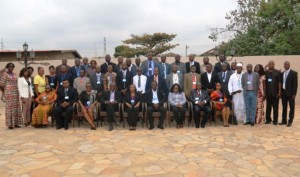African leaders want drug use decriminalized in new strategy

In the build-up to the UN General Assembly Special Session (UNGASS) on the world drug problem in April 2016, West African leaders want to chart a new course in the fight against drugs, amidst consensus that the current war on drugs has failed.
Some studies have shown, prices of drugs are falling while their purity is increasing. Trafficking and seizures being made by authorities have also increased around the world.
For long, laws in the West African region, as in many other world regions, have attacked the problem of drug trafficking and drug use from a criminal perspective, with little attention to this peculiar feature of the problem: the criminals – at least some of them – double up as the victims.
The laws however have treated drug traffickers and drug users as criminals.
Former UN Secretary General Kofi Anna once said: “Drugs have harmed many people but bad governmental policies have harmed many more.”
He is not the only one to have pointed that out and the issue has been steadily gaining momentum and attention in recent years.
Under the auspices of the West Africa Civil Society Institute (WACSI), a non-governmental capacity-building organization for civil society, representatives from state ministries, national and regional drug law enforcement agencies, human rights institutions and civil society in the West African sub-region, are currently meeting in Accra ahead of the UNGASS, to reassess the prevailing strategy in the war against drugs, discuss the need for policy reforms and take a collective stance on the issue.
Participating countries are Benin, Cape Verde, Côte d’Ivoire, Ghana, Guinea, Guinea Bisssau, Liberia, Mali, Nigeria, Senegal and Sierra Leone.
“One of the big challenges we have in the fight against drugs is that the same hand is dealt drug traffickers and drug users”, Nana Afadzinu, Executive Director of WACSI said.
Maria Gorreti Ane, a consultant for Africa with the International Drug Policy Consortium (IDPC), a global network of over 140 NGOs concerned with drug policy, says the criminalization of drug use over the years has drawn funds from public health into law enforcement, overburdened prison systems and resulted in human rights violations and marginalization of drug users.
The current drug policy environment and the morality approach she says, also perpetuate withdrawal and isolation on the part of drug users who are unable to disclose their predicament and access public health institutions.
In addition, punitive measures are not applied proportionately and jail does not reform drug users: there are even drugs in some jails, necessitating the removal of incarceration for non-violent and non-problematic drug users.
“Mounting evidence has shown us that the war has been a failure. Our own report produced by the West Africa Commission on Drugs came out with evidence-based recommendations and they have told us that it is a failure.”
“We need to end the criminalization of people who use drugs”, she said.
Although decriminalization of drug use is an issue that is unsettling to sections of society, representatives believe the quantities of drugs intercepted by authorities, can offer insight into distinguishing between drug traffickers and drug users.
“Punishing drug users is not the best way forward – they need help, they need treatment, they need rehabilitation. We have seen people who have gone through drug problems and yet they are doing very well in society because a second chance was given to them to recover and they did recover; and they are doing well and contributing to the development of our respective countries.”
Lansana Gberie, a consultant of UNGASS with the Open Society Foundation, says the definition of drug addiction as “a chronic relapsing brain disease…” by the US National Institute on Drug Abuse should be of interest to experts in Africa.
The movement for a new paradigm in Africa however faces a significant hurdle: data and evidence. Some experts also concede that evidence for the success of the new strategy being advocated for, is limited.
By Emmanuel Odonkor
